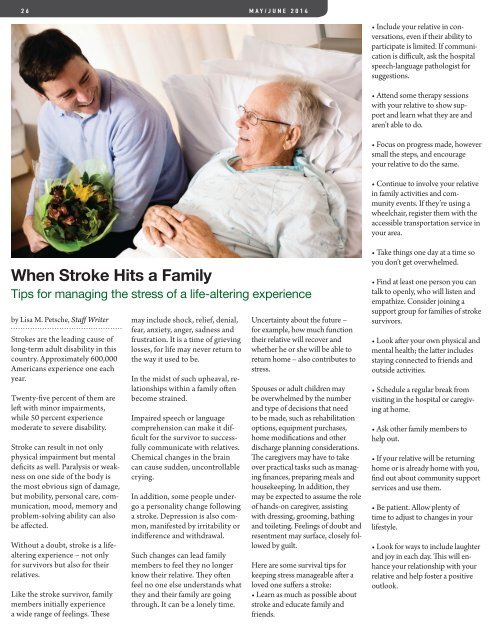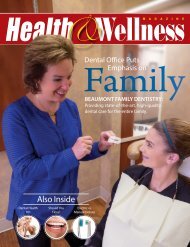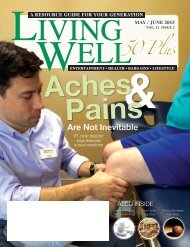Living Well 60+ May-June 2014
You also want an ePaper? Increase the reach of your titles
YUMPU automatically turns print PDFs into web optimized ePapers that Google loves.
2 6 MAY/JUNE 2 0 1 4<br />
• Include your relative in conversations,<br />
even if their ability to<br />
participate is limited. If communication<br />
is difficult, ask the hospital<br />
speech-language pathologist for<br />
suggestions.<br />
• Attend some therapy sessions<br />
with your relative to show support<br />
and learn what they are and<br />
aren’t able to do.<br />
• Focus on progress made, however<br />
small the steps, and encourage<br />
your relative to do the same.<br />
• Continue to involve your relative<br />
in family activities and community<br />
events. If they’re using a<br />
wheelchair, register them with the<br />
accessible transportation service in<br />
your area.<br />
When Stroke Hits a Family<br />
Tips for managing the stress of a life-altering experience<br />
by Lisa M. Petsche, Staff Writer<br />
Strokes are the leading cause of<br />
long-term adult disability in this<br />
country. Approximately 600,000<br />
Americans experience one each<br />
year.<br />
Twenty-five percent of them are<br />
left with minor impairments,<br />
while 50 percent experience<br />
moderate to severe disability.<br />
Stroke can result in not only<br />
physical impairment but mental<br />
deficits as well. Paralysis or weakness<br />
on one side of the body is<br />
the most obvious sign of damage,<br />
but mobility, personal care, communication,<br />
mood, memory and<br />
problem-solving ability can also<br />
be affected.<br />
Without a doubt, stroke is a lifealtering<br />
experience – not only<br />
for survivors but also for their<br />
relatives.<br />
Like the stroke survivor, family<br />
members initially experience<br />
a wide range of feelings. These<br />
may include shock, relief, denial,<br />
fear, anxiety, anger, sadness and<br />
frustration. It is a time of grieving<br />
losses, for life may never return to<br />
the way it used to be.<br />
In the midst of such upheaval, relationships<br />
within a family often<br />
become strained.<br />
Impaired speech or language<br />
comprehension can make it difficult<br />
for the survivor to successfully<br />
communicate with relatives.<br />
Chemical changes in the brain<br />
can cause sudden, uncontrollable<br />
crying.<br />
In addition, some people undergo<br />
a personality change following<br />
a stroke. Depression is also common,<br />
manifested by irritability or<br />
indifference and withdrawal.<br />
Such changes can lead family<br />
members to feel they no longer<br />
know their relative. They often<br />
feel no one else understands what<br />
they and their family are going<br />
through. It can be a lonely time.<br />
Uncertainty about the future –<br />
for example, how much function<br />
their relative will recover and<br />
whether he or she will be able to<br />
return home – also contributes to<br />
stress.<br />
Spouses or adult children may<br />
be overwhelmed by the number<br />
and type of decisions that need<br />
to be made, such as rehabilitation<br />
options, equipment purchases,<br />
home modifications and other<br />
discharge planning considerations.<br />
The caregivers may have to take<br />
over practical tasks such as managing<br />
finances, preparing meals and<br />
housekeeping. In addition, they<br />
may be expected to assume the role<br />
of hands-on caregiver, assisting<br />
with dressing, grooming, bathing<br />
and toileting. Feelings of doubt and<br />
resentment may surface, closely followed<br />
by guilt.<br />
Here are some survival tips for<br />
keeping stress manageable after a<br />
loved one suffers a stroke:<br />
• Learn as much as possible about<br />
stroke and educate family and<br />
friends.<br />
• Take things one day at a time so<br />
you don’t get overwhelmed.<br />
• Find at least one person you can<br />
talk to openly, who will listen and<br />
empathize. Consider joining a<br />
support group for families of stroke<br />
survivors.<br />
• Look after your own physical and<br />
mental health; the latter includes<br />
staying connected to friends and<br />
outside activities.<br />
• Schedule a regular break from<br />
visiting in the hospital or caregiving<br />
at home.<br />
• Ask other family members to<br />
help out.<br />
• If your relative will be returning<br />
home or is already home with you,<br />
find out about community support<br />
services and use them.<br />
• Be patient. Allow plenty of<br />
time to adjust to changes in your<br />
lifestyle.<br />
• Look for ways to include laughter<br />
and joy in each day. This will enhance<br />
your relationship with your<br />
relative and help foster a positive<br />
outlook.
















